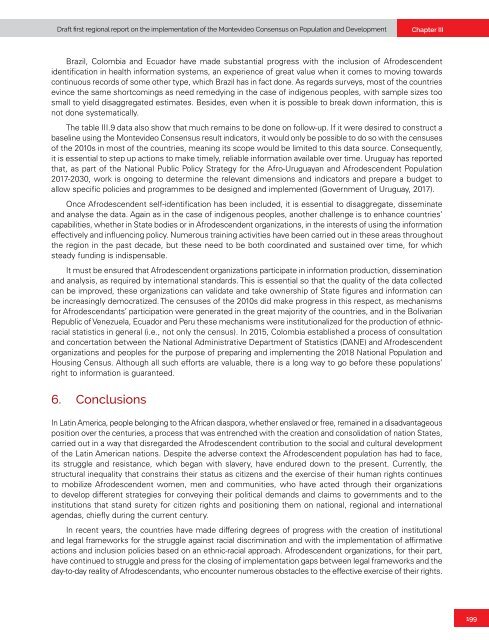Draft first regional report on the implementation of the Montevideo Consensus on Population and Development
This draft report seeks to give an account of progress in the implementation of the priority measures of the Montevideo Consensus on Population and Development in the region, as well as the differences between countries in terms of the degree of implementation. By highlighting relevant national experiences, it also seeks to facilitate the exchange of good practices among countries so that they can benefit from each other in their efforts to advance the implementation of the actions of the Montevideo Consensus.
This draft report seeks to give an account of progress in the implementation of the priority measures of the Montevideo Consensus on Population and Development in the region, as well as the differences between countries in terms of the degree of implementation. By highlighting relevant national experiences, it also seeks to facilitate the exchange of good practices among countries so that they can benefit from each other in their efforts to advance the implementation of the actions of the Montevideo Consensus.
You also want an ePaper? Increase the reach of your titles
YUMPU automatically turns print PDFs into web optimized ePapers that Google loves.
<str<strong>on</strong>g>Draft</str<strong>on</strong>g> <str<strong>on</strong>g>first</str<strong>on</strong>g> <str<strong>on</strong>g>regi<strong>on</strong>al</str<strong>on</strong>g> <str<strong>on</strong>g>report</str<strong>on</strong>g> <strong>on</strong> <strong>the</strong> implementati<strong>on</strong> <strong>of</strong> <strong>the</strong> M<strong>on</strong>tevideo C<strong>on</strong>sensus <strong>on</strong> Populati<strong>on</strong> <strong>and</strong> <strong>Development</strong><br />
Chapter III<br />
Brazil, Colombia <strong>and</strong> Ecuador have made substantial progress with <strong>the</strong> inclusi<strong>on</strong> <strong>of</strong> Afrodescendent<br />
identificati<strong>on</strong> in health informati<strong>on</strong> systems, an experience <strong>of</strong> great value when it comes to moving towards<br />
c<strong>on</strong>tinuous records <strong>of</strong> some o<strong>the</strong>r type, which Brazil has in fact d<strong>on</strong>e. As regards surveys, most <strong>of</strong> <strong>the</strong> countries<br />
evince <strong>the</strong> same shortcomings as need remedying in <strong>the</strong> case <strong>of</strong> indigenous peoples, with sample sizes too<br />
small to yield disaggregated estimates. Besides, even when it is possible to break down informati<strong>on</strong>, this is<br />
not d<strong>on</strong>e systematically.<br />
The table III.9 data also show that much remains to be d<strong>on</strong>e <strong>on</strong> follow-up. If it were desired to c<strong>on</strong>struct a<br />
baseline using <strong>the</strong> M<strong>on</strong>tevideo C<strong>on</strong>sensus result indicators, it would <strong>on</strong>ly be possible to do so with <strong>the</strong> censuses<br />
<strong>of</strong> <strong>the</strong> 2010s in most <strong>of</strong> <strong>the</strong> countries, meaning its scope would be limited to this data source. C<strong>on</strong>sequently,<br />
it is essential to step up acti<strong>on</strong>s to make timely, reliable informati<strong>on</strong> available over time. Uruguay has <str<strong>on</strong>g>report</str<strong>on</strong>g>ed<br />
that, as part <strong>of</strong> <strong>the</strong> Nati<strong>on</strong>al Public Policy Strategy for <strong>the</strong> Afro-Uruguayan <strong>and</strong> Afrodescendent Populati<strong>on</strong><br />
2017-2030, work is <strong>on</strong>going to determine <strong>the</strong> relevant dimensi<strong>on</strong>s <strong>and</strong> indicators <strong>and</strong> prepare a budget to<br />
allow specific policies <strong>and</strong> programmes to be designed <strong>and</strong> implemented (Government <strong>of</strong> Uruguay, 2017).<br />
Once Afrodescendent self-identificati<strong>on</strong> has been included, it is essential to disaggregate, disseminate<br />
<strong>and</strong> analyse <strong>the</strong> data. Again as in <strong>the</strong> case <strong>of</strong> indigenous peoples, ano<strong>the</strong>r challenge is to enhance countries’<br />
capabilities, whe<strong>the</strong>r in State bodies or in Afrodescendent organizati<strong>on</strong>s, in <strong>the</strong> interests <strong>of</strong> using <strong>the</strong> informati<strong>on</strong><br />
effectively <strong>and</strong> influencing policy. Numerous training activities have been carried out in <strong>the</strong>se areas throughout<br />
<strong>the</strong> regi<strong>on</strong> in <strong>the</strong> past decade, but <strong>the</strong>se need to be both coordinated <strong>and</strong> sustained over time, for which<br />
steady funding is indispensable.<br />
It must be ensured that Afrodescendent organizati<strong>on</strong>s participate in informati<strong>on</strong> producti<strong>on</strong>, disseminati<strong>on</strong><br />
<strong>and</strong> analysis, as required by internati<strong>on</strong>al st<strong>and</strong>ards. This is essential so that <strong>the</strong> quality <strong>of</strong> <strong>the</strong> data collected<br />
can be improved, <strong>the</strong>se organizati<strong>on</strong>s can validate <strong>and</strong> take ownership <strong>of</strong> State figures <strong>and</strong> informati<strong>on</strong> can<br />
be increasingly democratized. The censuses <strong>of</strong> <strong>the</strong> 2010s did make progress in this respect, as mechanisms<br />
for Afrodescendants’ participati<strong>on</strong> were generated in <strong>the</strong> great majority <strong>of</strong> <strong>the</strong> countries, <strong>and</strong> in <strong>the</strong> Bolivarian<br />
Republic <strong>of</strong> Venezuela, Ecuador <strong>and</strong> Peru <strong>the</strong>se mechanisms were instituti<strong>on</strong>alized for <strong>the</strong> producti<strong>on</strong> <strong>of</strong> ethnicracial<br />
statistics in general (i.e., not <strong>on</strong>ly <strong>the</strong> census). In 2015, Colombia established a process <strong>of</strong> c<strong>on</strong>sultati<strong>on</strong><br />
<strong>and</strong> c<strong>on</strong>certati<strong>on</strong> between <strong>the</strong> Nati<strong>on</strong>al Administrative Department <strong>of</strong> Statistics (DANE) <strong>and</strong> Afrodescendent<br />
organizati<strong>on</strong>s <strong>and</strong> peoples for <strong>the</strong> purpose <strong>of</strong> preparing <strong>and</strong> implementing <strong>the</strong> 2018 Nati<strong>on</strong>al Populati<strong>on</strong> <strong>and</strong><br />
Housing Census. Although all such efforts are valuable, <strong>the</strong>re is a l<strong>on</strong>g way to go before <strong>the</strong>se populati<strong>on</strong>s’<br />
right to informati<strong>on</strong> is guaranteed.<br />
6. C<strong>on</strong>clusi<strong>on</strong>s<br />
In Latin America, people bel<strong>on</strong>ging to <strong>the</strong> African diaspora, whe<strong>the</strong>r enslaved or free, remained in a disadvantageous<br />
positi<strong>on</strong> over <strong>the</strong> centuries, a process that was entrenched with <strong>the</strong> creati<strong>on</strong> <strong>and</strong> c<strong>on</strong>solidati<strong>on</strong> <strong>of</strong> nati<strong>on</strong> States,<br />
carried out in a way that disregarded <strong>the</strong> Afrodescendent c<strong>on</strong>tributi<strong>on</strong> to <strong>the</strong> social <strong>and</strong> cultural development<br />
<strong>of</strong> <strong>the</strong> Latin American nati<strong>on</strong>s. Despite <strong>the</strong> adverse c<strong>on</strong>text <strong>the</strong> Afrodescendent populati<strong>on</strong> has had to face,<br />
its struggle <strong>and</strong> resistance, which began with slavery, have endured down to <strong>the</strong> present. Currently, <strong>the</strong><br />
structural inequality that c<strong>on</strong>strains <strong>the</strong>ir status as citizens <strong>and</strong> <strong>the</strong> exercise <strong>of</strong> <strong>the</strong>ir human rights c<strong>on</strong>tinues<br />
to mobilize Afrodescendent women, men <strong>and</strong> communities, who have acted through <strong>the</strong>ir organizati<strong>on</strong>s<br />
to develop different strategies for c<strong>on</strong>veying <strong>the</strong>ir political dem<strong>and</strong>s <strong>and</strong> claims to governments <strong>and</strong> to <strong>the</strong><br />
instituti<strong>on</strong>s that st<strong>and</strong> surety for citizen rights <strong>and</strong> positi<strong>on</strong>ing <strong>the</strong>m <strong>on</strong> nati<strong>on</strong>al, <str<strong>on</strong>g>regi<strong>on</strong>al</str<strong>on</strong>g> <strong>and</strong> internati<strong>on</strong>al<br />
agendas, chiefly during <strong>the</strong> current century.<br />
In recent years, <strong>the</strong> countries have made differing degrees <strong>of</strong> progress with <strong>the</strong> creati<strong>on</strong> <strong>of</strong> instituti<strong>on</strong>al<br />
<strong>and</strong> legal frameworks for <strong>the</strong> struggle against racial discriminati<strong>on</strong> <strong>and</strong> with <strong>the</strong> implementati<strong>on</strong> <strong>of</strong> affirmative<br />
acti<strong>on</strong>s <strong>and</strong> inclusi<strong>on</strong> policies based <strong>on</strong> an ethnic-racial approach. Afrodescendent organizati<strong>on</strong>s, for <strong>the</strong>ir part,<br />
have c<strong>on</strong>tinued to struggle <strong>and</strong> press for <strong>the</strong> closing <strong>of</strong> implementati<strong>on</strong> gaps between legal frameworks <strong>and</strong> <strong>the</strong><br />
day-to-day reality <strong>of</strong> Afrodescendants, who encounter numerous obstacles to <strong>the</strong> effective exercise <strong>of</strong> <strong>the</strong>ir rights.<br />
199


















